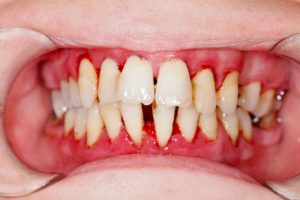 Gum recession is when the edge of the gum tissue that covers the teeth shrinks or recedes. When the gum recedes, it exposes more of the tooth. In severe cases, it exposes the tooth’s root as well. Once enough gum recession occurs, gaps form between the teeth and gum line that covers the tooth. These gaps or pockets provide an easy way for bacteria to build up.
Gum recession is when the edge of the gum tissue that covers the teeth shrinks or recedes. When the gum recedes, it exposes more of the tooth. In severe cases, it exposes the tooth’s root as well. Once enough gum recession occurs, gaps form between the teeth and gum line that covers the tooth. These gaps or pockets provide an easy way for bacteria to build up.
While it is not a normal part of the aging process, gum recession is a common dental issue. Some are not aware they have receding gums because it usually occurs gradually.
How Do I Know?
A common sign of gum recession is tooth sensitivity or increased tooth sensitivity. If the gum recession is advanced, you may notice that your tooth or teeth look longer than usual. You may also be able to feel a notch in your teeth near your gum line. Gum recession is easily seen on the front of your teeth. However, it also occurs on the back of teeth as well.
What Causes Gum Recession?
Periodontal disease: Occurs when bacterial infections of the gum destroy gum tissue and the nearby surrounding bone that hold teeth in place. The main cause of gum recession is gum disease.
Genes: Some of the population may be more susceptible to gum disease.
Aggressive tooth brushing: If you brush your teeth too hard or the wrong way, it can cause the enamel on your teeth to wear away and your gums to recede.
Inadequate dental care: Inadequate dental care makes it easy for plaque to harden into calculus or tartar. Calculus is a hard material that builds on and in between teeth. Once it plaque hardens, it can only be removed through a professional dental cleaning. If left untreated, the calculus deposit enlarges, and leads to gum recession.
Hormonal changes: Changes in hormone levels can make gums more feel extra sensitive and sometimes vulnerable to gum recession.
Tobacco products: Those who use tobacco products are more likely to have plaque on their teeth that is difficult to remove. This leads to hardening (calculus formation) which causes gum recession over time.
Grinding & clenching teeth: Putting too much force on the teeth by clenching or grinding teeth can cause the gums to recede.
Uneven Bite: When there is an uneven bite, pressure or force is distributed unevenly, causing gums to recede.
Lip or tongue piercings: Jewelry worn in the mouth or on the lip can rub against the gums. Over time it irritates the tissues until they wear away.
How Is It Treated?
Mild gum recession may be treated by properly cleaning the affected area of any plaque and calculus that has built up there. Antibiotics may be prescribed to help with any remaining harmful bacteria.
Moderate to severe gum recession that includes the loss of supporting bone and large pockets or gaps will require gum surgery to gain access and properly clean the affected area. If too much supporting bone has been lost, bone and tissue regeneration may be used. Gum tissue grafting may also be used to replace lost gum tissue, in order to protect against sensitivity and acid wear.
How Can Gum Recession Be Prevented?
Proper brushing technique and toothbrush selection is a great way to start. Regular dental exams will help your dentist and dental hygienist to monitor your oral condition for starting stages of gum recession. Never use a hard bristled toothbrush, only use soft-bristled toothbrushes. Ask your dentist or dental hygienist to show you the proper way to brush your teeth. Correcting an uneven bite may help as well, your dentist can let you know if that will help in your situation.
If you have gum recession and would like to have it treated, contact us for a free consultation.
About Dr. Joseph Salvaggio

Located in Brampton, Ontario Dr. Joseph Salvaggio has been practicing general, cosmetic, and implant dentistry for over 20 years. He enjoys interacting with his patients and helping to restore their oral health for better overall health as well. Meeting new patients, interacting and educating them is one of Dr. Salvaggio’s biggest joys. We encourage you to read our reviews or call us with any dental questions you have. We look forward to speaking with you and meeting you soon.
